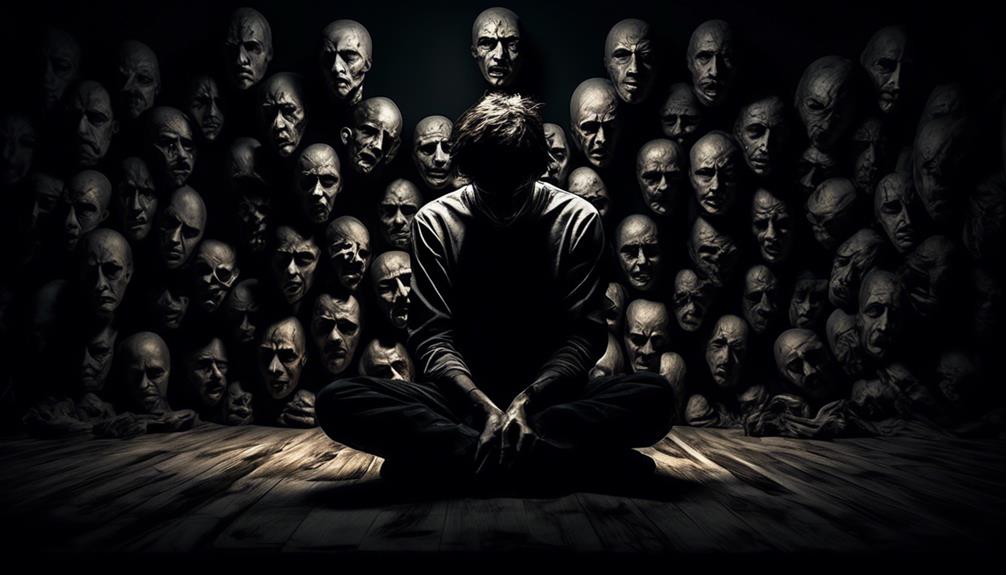In the field of mental health, it may seem perplexing that hallucinations could be a symptom of PTSD. However, new studies have uncovered a potential connection between these seemingly unrelated experiences.
As we explore the intricate interplay between trauma and the mind, it becomes evident that the impact of PTSD can extend beyond the traditional symptoms we associate with this condition. Could there be a hidden connection waiting to be unraveled?
Let's journey deeper into the complexities of PTSD and its possible effects on perception.
Key Takeaways
- Hallucinations can occur in individuals with PTSD, resembling those seen in schizophrenia.
- Traumatic events and ongoing stress contribute to PTSD-induced hallucinations.
- Auditory, visual, and tactile hallucinations are common in PTSD.
- Treatment options for PTSD hallucinations include CBT, medication, EMDR therapy, mindfulness practices, and support groups.
PTSD Symptoms and Hallucinations
Hallucinations, though not a primary symptom of PTSD, can manifest in individuals with trauma-spectrum disorders. Research indicates that hallucinations aren't uncommon in the context of trauma-related conditions, such as PTSD. While flashbacks are more commonly associated with PTSD, hallucinations can also occur, resembling those seen in schizophrenia. Exposure to traumatic events is a significant trigger for PTSD-induced hallucinations. Additionally, ongoing stress and individual factors like a history of mental illness can contribute to the development of these hallucinations within the PTSD framework.
Understanding the distinction between flashbacks and hallucinations is crucial for accurate assessment and treatment of PTSD. Hallucinations encompass sensory experiences that can involve any of the senses, further complicating the mental health landscape for individuals with PTSD. Seeking professional help from healthcare providers, such as doctors or therapists, is essential for managing PTSD and addressing the potential emergence of hallucinations in the context of this mental disorder.
Causes of PTSD-Induced Hallucinations

In understanding the link between PTSD symptoms and hallucinations, exploring the underlying causes of PTSD-induced hallucinations becomes paramount.
Exposure to traumatic events is a primary cause of PTSD-induced hallucinations. Ongoing stress from high-stress environments or continuous trauma can also contribute to hallucinations in PTSD. Individual factors such as a history of mental illness, family mental health history, or substance abuse can play a role in the development of PTSD-induced hallucinations.
Traumatic experiences can lead to the formation of inaccurate but overly precise prior beliefs, triggering hallucinations in PTSD. Aberrant predictive coding and the misapplication of strong prior beliefs may also explain hallucinations in PTSD.
While hallucinations aren't part of the official criteria for PTSD, changes in the brain's structure and neurophysiology can contribute to both PTSD symptoms and hallucinations. Seeking help from healthcare professionals is crucial for managing PTSD and comorbid hallucinations effectively.
Types of Hallucinations in PTSD
Auditory hallucinations are frequently observed as the predominant type of hallucinations in individuals with PTSD. Understanding the different types of hallucinations in PTSD is crucial for proper diagnosis and treatment. Here are some key points regarding the types of hallucinations in PTSD:
- Auditory Hallucinations: These are the most common type of hallucinations in PTSD, involving hearing voices or sounds that aren't present.
- Visual Hallucinations: While less common, individuals with PTSD may also experience visual hallucinations, which involve seeing things that aren't actually there.
- Tactile Hallucinations: This type of hallucination involves feeling sensations on the skin that aren't real, such as bugs crawling on the skin.
- Heightened Sensory Experiences: In addition to hallucinations, individuals with PTSD may also experience heightened sensory experiences like a heightened sense of smell, taste, or feeling as though they're reliving the traumatic event through their senses.
Recognizing and addressing these types of hallucinations in individuals experiencing posttraumatic stress disorder symptoms is essential for providing appropriate mental health support.
Treatment Options for PTSD Hallucinations

When addressing PTSD-related hallucinations, therapeutic interventions like cognitive-behavioral therapy (CBT) play a crucial role in helping individuals manage their symptoms effectively. CBT assists in identifying and challenging negative thoughts that contribute to hallucinations in individuals with PTSD.
Additionally, medications such as antipsychotics or antidepressants may be prescribed to reduce hallucinations. Combining psychotherapy with medication is a common approach in treating PTSD-induced hallucinations.
Eye movement desensitization and reprocessing (EMDR) therapy have shown effectiveness in addressing both PTSD and associated hallucinations. Mindfulness practices like meditation and yoga can aid individuals in coping with hallucinations and alleviating distress.
Support groups and peer support offer a safe environment for individuals experiencing PTSD and hallucinations to share experiences and learn coping strategies.
PTSD and Comorbid Psychotic Disorders
The co-occurrence of PTSD and psychotic disorders presents a complex challenge in mental health diagnosis and treatment. When these two conditions intersect, it can significantly impact an individual's well-being and quality of life.
Here are some key points to consider regarding PTSD and comorbid psychotic disorders:
- Shared Phenomenological Features: Hallucinations in PTSD and schizophrenia can exhibit similar characteristics, such as auditory hallucinations or other sensory experiences. These shared features can sometimes blur the lines between the two disorders.
- Impact of Traumatic Events: Traumatic experiences can contribute to the development of psychotic symptoms in individuals with PTSD. The intensity and nature of the trauma can influence the manifestation of hallucinations in posttraumatic stress.
- Differential Diagnosis: Distinguishing between comorbid psychotic disorders and PTSD can be challenging due to overlapping symptoms. Careful assessment and thorough evaluation are essential to provide accurate diagnoses and appropriate treatment.
- Integrated Treatment Approaches: Addressing both PTSD and comorbid psychotic disorders may require a comprehensive treatment plan that combines therapies targeting PTSD symptoms and psychotic features. Collaboration between mental health professionals is crucial for effective management of these complex conditions.
Frequently Asked Questions
Can PTSD Turn Into Psychosis?
We need to consider the complex relationship between PTSD and psychosis.
While PTSD itself doesn't typically lead directly to psychosis, there can be instances where individuals with PTSD may experience symptoms that overlap with psychosis.
Factors such as ongoing stress, individual predispositions, and severity of trauma can influence the development of psychotic symptoms in some cases.
Seeking professional help is crucial for comprehensive evaluation and appropriate treatment.
Can PTSD Make You Imagine Things?
Yes, PTSD can lead to imagining things. Like a vivid dream, these imaginings can be intense and feel very real. Trauma can trigger the brain to create scenarios that aren't actually happening, causing distress.
These imagined experiences are a common aspect of PTSD, reflecting the mind's attempt to process and cope with the trauma. Understanding this phenomenon is crucial in providing effective support and treatment for individuals experiencing PTSD-related imaginings.
What Does a PTSD Episode Look Like?
A PTSD episode typically involves reexperiencing traumatic events, avoidance behaviors, and changes in mood and arousal. Symptoms may vary from person to person but can include intense emotional reactions, flashbacks, nightmares, and hypervigilance.
Seeking help from a doctor or therapist is crucial for managing PTSD. Treatment usually involves a combination of psychotherapy and medication. It's essential to address these symptoms to improve overall well-being and quality of life.
What Are the 17 Symptoms of Complex Ptsd?
When discussing the 17 symptoms of Complex PTSD, it's important to note the wide range of experiences individuals may face.
These symptoms can include reexperiencing traumatic events, avoidance behaviors, mood changes, and arousal symptoms.
Intrusive symptoms like flashbacks and nightmares, avoidant behaviors, and arousal symptoms such as irritability and hypervigilance are commonly observed.
Understanding these symptoms is crucial in providing effective support and treatment for those with Complex PTSD.
Conclusion
In conclusion, PTSD can indeed cause hallucinations, although it may not be a classic symptom. These hallucinations can be distressing and may resemble those seen in schizophrenia.
With proper treatment, such as a combination of therapy and medication, individuals with PTSD-induced hallucinations can experience a reduction in their frequency and intensity.
For example, Sarah, a combat veteran diagnosed with PTSD, reported experiencing vivid auditory hallucinations of gunshots whenever she heard loud noises, highlighting the impact of trauma on the mind.









